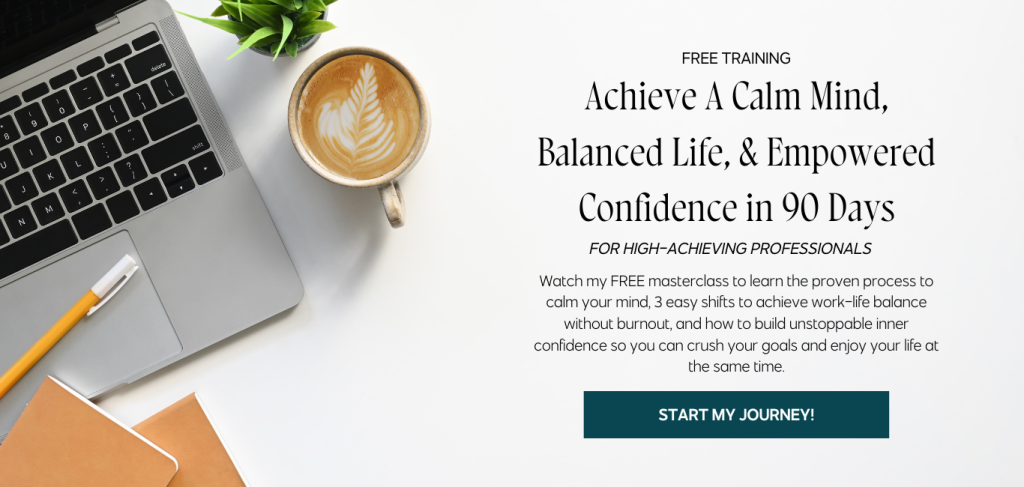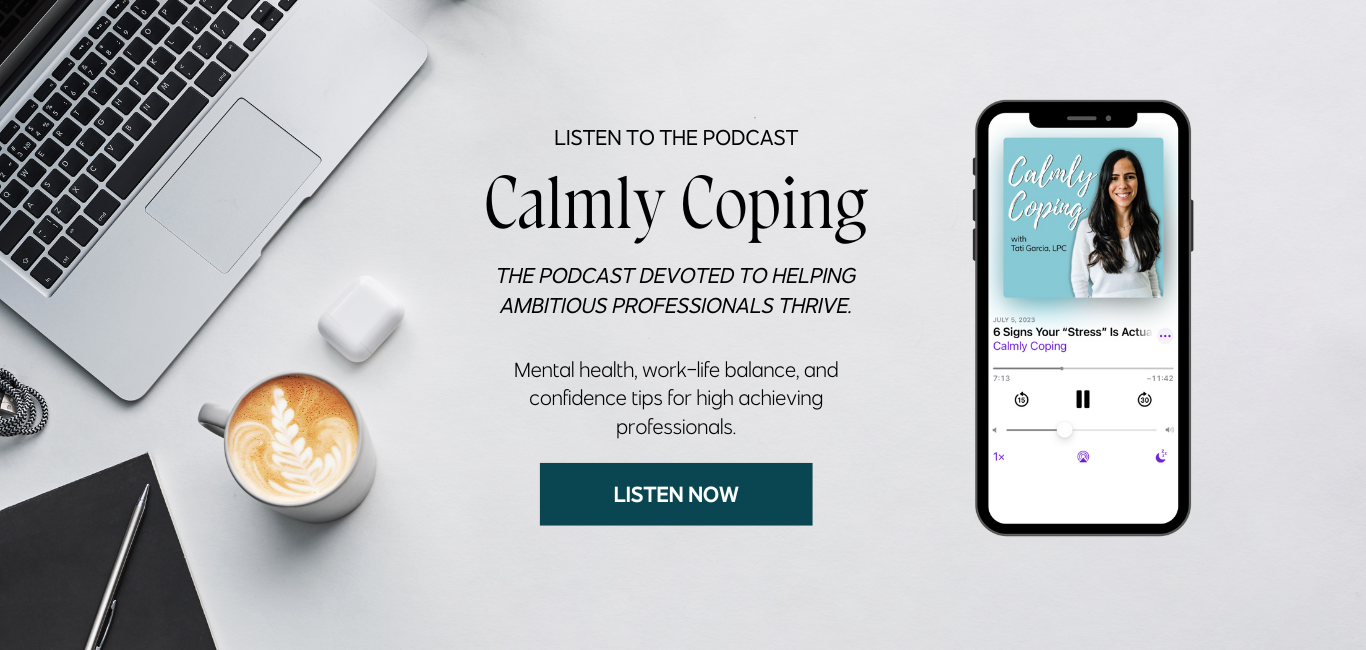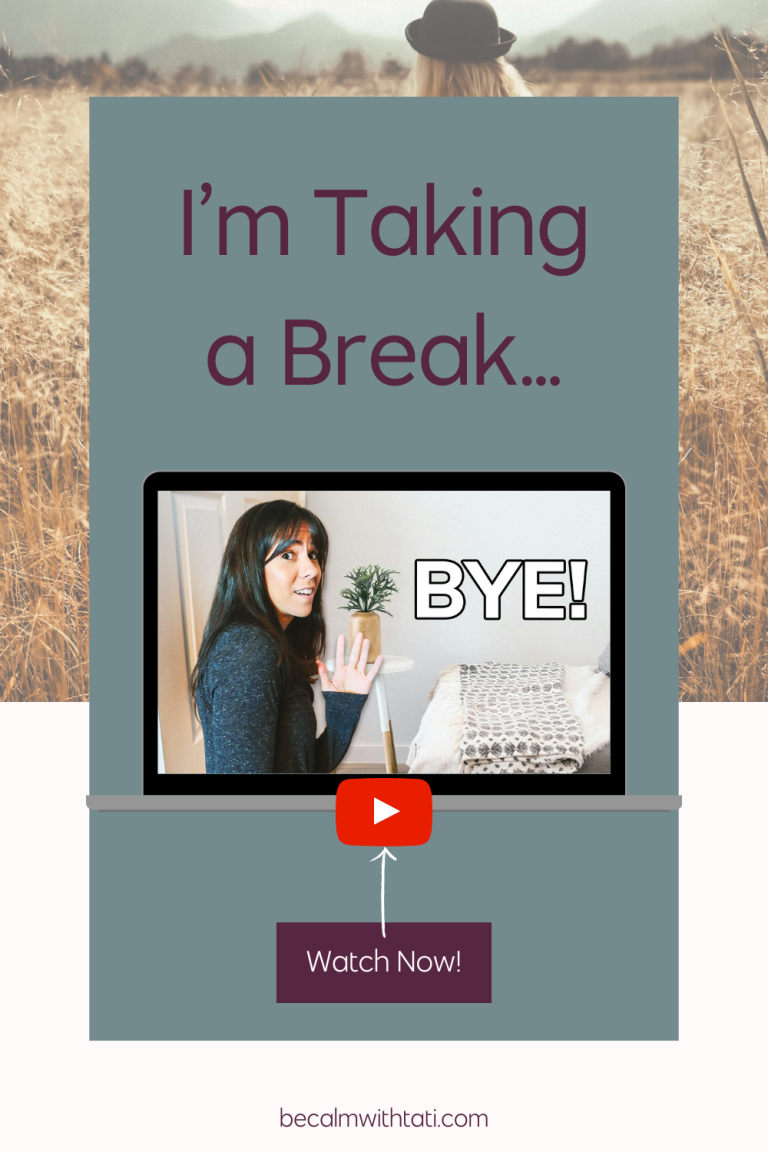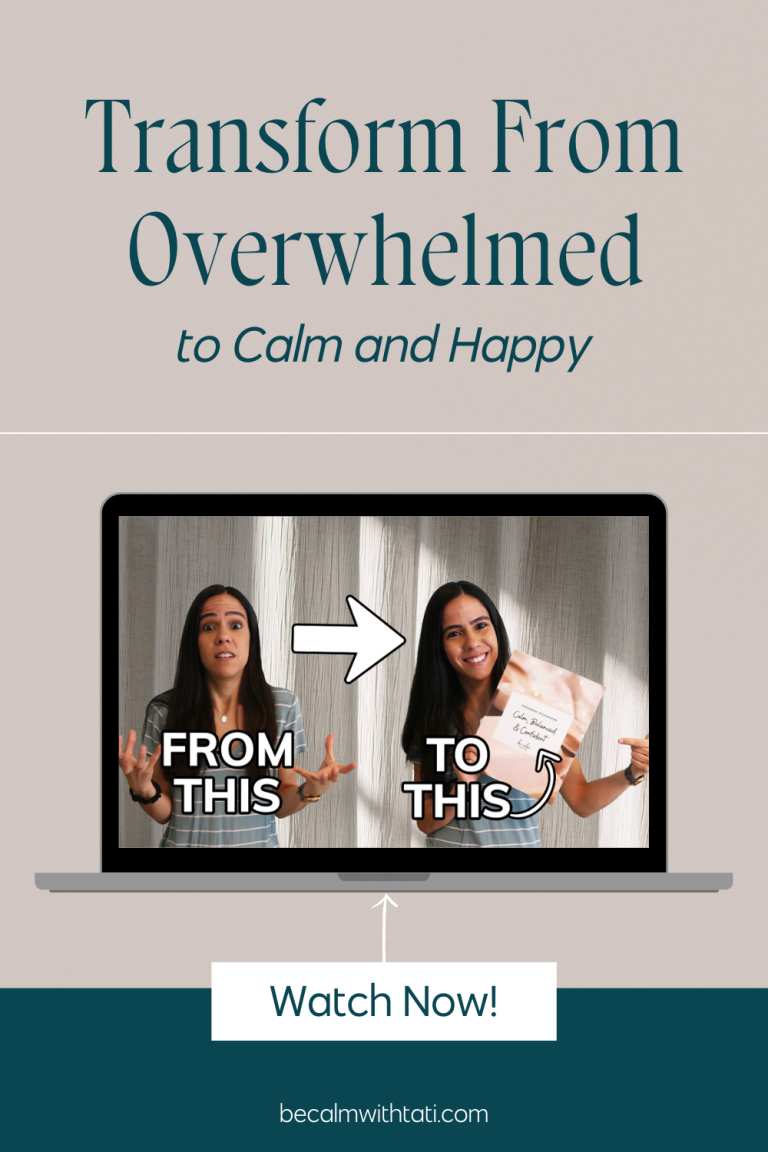If you’ve been feeling constantly on edge, overwhelmed, anxious, or just stuck in a cycle of never-ending stress, then you might be functioning in survival mode. This can be exhausting and harmful to your mental and physical health. Stay tuned as I share my top therapist-approved tips to help you heal your nervous system so you can find calm and regain a sense of peace in your life.
In this episode, you will learn:
- The science behind why you’re stuck in survival mode
- 7 practical steps to help you heal your nervous system
- The surprising first step that is often overlooked, yet is the most important
Mentioned in episode:
5 Tips to Stop Rushing Through Your Life (for high achievers): https://www.becalmwithtati.com/stop-rushing-through-life/
What To Do When You Can’t Sleep (because of overthinking): https://www.becalmwithtati.com/cant-sleep/
LISTEN NOW:
🎧 CLICK HERE TO LISTEN TO CALMLY COPING WHEREVER YOU LISTEN TO PODCASTS
WATCH NOW:
GET ON THE WAITLIST FOR MY 1:1 SERVICES: Waitlist
LEARN MORE ABOUT THE CALM & AMBITIOUS MEMBERSHIP: Membership
SUBMIT A MESSAGE, QUESTION, COMMENT OR SUGGESTION TO THE PODCAST: Message
FREE TRAINING: Achieve A Calm Mind, Balanced Life, & Empowered Confidence in 90 Days
If you want to learn how to take back control of your life so you can feel calmer and more confident, and learn the tools to spend your time according to what matters most to you (no matter what your schedule is like right now)…

LISTEN, REVIEW, AND SUBSCRIBE TO THE PODCAST!

INTRO/OUTRO MUSIC: Rescue Me (Instrumental) by Aussens@iter (c) copyright 2018 Licensed under a Creative Commons Attribution (3.0) license. http://dig.ccmixter.org/files/tobias_weber/57990 Ft: Copperhead
DISCLAIMER: All content here is for informational purposes only. This content does not replace the professional judgment of your own mental health provider. Please consult a licensed mental health professional for all individual questions and issues.
Interested in diving deeper to get support for high-functioning anxiety?
I offer 1:1 coaching to help high-achievers overcoming high-functioning anxiety so they can feel calmer, more present, and have improved balance in their lives. Click here if you’re interested in learning more and getting started.
Calm, Balanced, & Confident is my comprehensive A→Z self-paced course to help high-achieving professionals overcome high-functioning anxiety so they can feel calmer, balanced, and more confident without the anxiety and overwhelm. Click here to learn more and enroll today.
Looking for ongoing support and guidance with high-functioning anxiety? The Calm & Ambitious Community is the exclusive community for high achievers with high-functioning anxiety. Click here to learn more and join us today!
TRANSCRIPT:
Click to view the episode transcript.
If you’ve been feeling constantly on edge, overwhelmed, anxious, or just stuck in a cycle of never ending stress, then you might be functioning in survival mode. This can be exhausting and harmful to your mental and physical health. Stay tuned as I share my top tips to help you heal your nervous system so you can regain a sense of calm and peace in your life.
Welcome to Calm and Coping. My name is Tati Garcia and I’m a licensed therapist and coach specializing in helping high achievers overcome anxiety, overwhelm, and burnout so they can feel calm, balanced, and confident from within. If this topic interests you, then please like, subscribe, and hit the notification bell so you’ll be notified every time I release a new episode.
Thank you so much for tuning in. First, I want to talk about what survival mode is. is. Maybe you’ve heard the term, but what does it mean exactly? So it’s really your body’s response to feeling threatened, to feeling as though there is a danger afoot. Your body has certain physiological and psychological reactions that occur.
You might have also heard of it referred to as the fight or flight response. So this is what kicks in when there is some sort of perceived threat or you’re under stress. It’s your body trying to protect you and trying to keep you safe in moments where there could be a potential danger occurring. And the same response happens whether it is an actual threat, like there is a bear in the woods and you need to protect yourself, or it is a perceived threat, like you’re worrying about the meeting that you have tomorrow and you’re feeling really anxious and stressed about that.
What happens during the fight or flight response is that things such as adrenaline and cortisol are released within your body and this turns on the response of your body either fighting, or the flight response, running away. There is also the freeze response that occurs, which is when you are freezing up, like the same way you would see a deer or a bunny freeze.
But basically, this sends blood to your extremities, to your arms and legs to get you ready to run away or to fight, and it also speeds up your heart rate. It makes your breathing more shallow, dilates your pupils so that you can be more aware of your surroundings, what’s going on around you, stops or slows down digestion.
That’s why if you’re somebody who struggles with anxiety or chronic stress, you may have digestive troubles, and it also results in other physiological changes that can help you to get to safety. The problem is when you’re experiencing this fight or flight response repeatedly, and it’s something that is occurring maybe because of chronic stress.
So maybe you’re constantly stressed. And so your body’s constantly in survival mode, constantly in fight or flight, and you never have the time to calm down or relax or recover or get to a place where your brain perceives there’s a sense of safety. This could also be caused by things like anxiety. So maybe you’re worried about finances and so you’re constantly feeling on edge.
This could be maybe, you know, a result of putting pressure on yourself or being super critical and so then your brain feels as though you constantly need to be on edge and working on things and you’re not doing enough or you’re being hard on yourself and this could also look like never allowing yourself to relax so maybe you’re the kind of person who constantly needs to be productive and doing more and you don’t allow yourself space to rest and recharge and because of that you may constantly feel in this state of survival mode as though you need to keep on going and going and going.
And unlike the Energizer Bunny, our batteries do run out and we need to recharge. So while the survival response can be helpful in short bursts, like I mentioned, when it’s something that’s occurring consistently and regularly then it actually is more harmful than helpful. It puts more strain on your body.
It causes more inflammation in your body, which is the thing that leads to physical illness and disease. And it also causes a lot of mental health issues. If you’re in a state of chronic stress and anxiety, then this isn’t going to be helpful or beneficial for your mental health. It’s going to be really challenging for you.
And it can also lead to things like insomnia. So maybe because your body is in this state of chronic survival mode, you’re having. Trouble even sleeping at night or getting to bed or having restful sleep. The good news is that if you’re in this place, there are ways to calm your nervous system and get out of survival mode.
So i’m going to be sharing my top tips to help you escape survival mode and heal your nervous system. Tip number one is getting to the root. I talked about a few different reasons as to why you may be in this place and feeling this way. What can really help is getting an understanding of why you’re feeling as though you’re in this constant survival mode.
Is it external stress? Is it internal pressure? Is it a combination of both? What is keeping you in this place of survival mode? Because understanding that can help you to then recognize, okay, what got me here? So then, are there any changes that I can make to get me out of this place? Sometimes that looks like quitting a job that’s way too stressful and it’s detrimental to your mental health.
Or sometimes that looks like setting clear boundaries when it comes to time that you are being productive and working and getting things done and making sure that you are being intentional about carving time out for rest and recharging. But this is the first step that I take all of my clients and students through is getting to the root of what is causing this.
And what can be really helpful is diving into the underlying thoughts and emotions that are leading to this. So maybe if it is financial anxiety, like I mentioned previously, maybe you fear that you don’t have enough money and so then you’re afraid of dropping the ball and you feel like you constantly need to be pushing yourself harder and working harder in order to stay afloat.
When in reality, maybe if you took a step back. back and you got a clearer picture of your finances and what you want your lifestyle to look like and made intentional changes there, then it’s possible that you could stop being in this constant state of survival mode, be accepting of your circumstances and either make changes or really rearrange things financially or make the best of your current situation without putting this excess stress and pressure on yourself.
Because regardless of what your circumstances are, when you’re putting this excess chronic stress and anxiety on yourself, there’s a point of diminishing returns. So some level of stress is helpful for us to get things done. But beyond that, it also only makes us suffer more. It only makes us feel worse.
And this is where a lot of people are when they’re in this state of survival mode and chronic stress and anxiety. Tip number two is to calm your body. So I mentioned before that the fight or flight response is survival mode response is very physiological. So there are a lot of things happening in our body, and it becomes a feedback loop.
So, your brain perceives a threat, communicates to your body to turn on this fight or flight response, and your body is in this state of heightened stress and getting you to safety, and then Because of this, that then communicates to your brain, the threat is still present, and it’s kind of back and forth.
So if you’re able to calm your body, then that can communicate to your brain that you are safe. It can communicate, alright, we don’t need to be in this heightened state of constant awareness and hypervigilance. We can calm down, relax, and turn things down. So this can look like the tried and true thing you might have heard many times before, taking deep breaths.
This is something that is said so often because it’s really helpful. I did this myself when actually like five minutes ago when I was having trouble getting my thoughts together while filming this episode. I paused, breathed in deeply into my belly and then breathed out. Something that can also be helpful is the audible sigh when you’re breathing.
So if you’ve ever kind of just like breathed in and then you’re sighing out and making that as loud or quiet as you want to, and that is something that physiologically activates that relaxation response in our body and communicates a sense of safety. That sigh is associated with relax, relief, and so there’s a reason for that because that’s something that helps us to get into that state and it communicates us being in that state.
Another thing that can be helpful physiologically is what is called progressive muscle relaxation. You can Google guided meditations or exercises for this. You can also just do it on your own. So there’s two different ways to do it. One is. Tensing and then releasing the muscles in your body one by one.
So maybe starting at your feet and then going up to your calves, your thighs, all of the muscles in your body, really squeezing them and then relaxing them. Another one is skipping the squeezing part and just releasing any tension in your body. So it’s all about finding what you prefer. I tend to prefer just releasing the tension in your body, but if you’re somebody who’s starting, sometimes doing the tensing and releasing can help because it gives you that contrast.
So you can start to become more aware of, okay, what does tension feel like in my body? Because it’s something that you might be carrying around. That is a reaction to that survival response being in that state of tension. And you might not even recognize it. And when your body’s in that state of tension, that’s communicating to your brain, right?
Be aware. Things aren’t safe. We can’t relax fully yet. So that’s another thing that can be helpful or anything helps you to be present and or relax your body such as yoga, stretching, walking, anything like that. Another thing that can help is splashing cold water in your face. This actually activates our mammalian dive reflex.
which actually slows down the heart rate and calms the nervous system. So if you’ve ever heard somebody say, just go splash some cold water on your face, that is something that could also be potentially helpful when you’re experiencing strong emotions, especially. So if you’re in a place where Maybe you’re having a panic attack or maybe you’re really feeling stressed and overwhelmed.
See if splashing some cold water in your face can help to calm your nervous system. And other forms of breath work can be really powerful. One form that I like is called the bumblebee breath. This is something I learned from doing yoga, but it’s essentially where you hum while you’re breathing out. So you kind of take a deep breath in and then so you hum while you’re breathing out.
This is kind of similar to that audible sigh. It’s another way of releasing any tension or stress that’s built up. You can do this in a place that feels comfortable for you. Maybe you’re on your own or maybe during a yoga class, but this is something that helps to stimulate the vagus nerve. And this is a nerve that runs from, I believe the base of the skull to the spine.
And it basically. stimulates that relaxation response in our body. So it communicates to your body that you are safe and it helps to slow down your heart rate. The opposite of that fight or flight response. Tip number three is to stop adding to your suffering or stress. This is a concept that is known as the second arrow from mindfulness.
And essentially what it is is that the first arrow is the source of suffering. So let’s say if, okay. There is something that happens that is particularly stressful for you. It’s like an arrow hitting you. It feels painful. It feels difficult. However, there is a second arrow that we hit ourselves with, and this is the judgment, the criticism, the stress and pressure that we add on top of what’s already happening to us.
This is the source of often a lot of our suffering. So if you can think about it this way, let’s say you had a conversation with your supervisor and you said, And it was stressful, they wanted to talk to you in their office, and you weren’t happy with how you handled the conversation. And so the conversation itself was stressful, but then after the fact, maybe you’re beating yourself up and saying, I shouldn’t have said that, or I should have said this, or I should have done things differently, shoulda, coulda, woulda, whatever.
That train of thought. The excess pressure, the shoulda, coulda, woulda is the second arrow. It is you just adding more suffering to your situation, especially in this situation when it’s something that is over, you can’t change. So this is something that we constantly do throughout our lives. Something simple is just, Complaining about the weather.
So let’s say if it is a cloudy or rainy day out and just saying, Oh, I hate rainy days. This is so terrible about something that we can’t control. Of course, we can have preferences and likes and dislikes. That’s a part of being human. However, when we are constantly resisting what is here and adding more of this extra the the suffering and stress and dislike and judgment on top of things, then it just makes things harder for ourselves and life is hard enough.
We don’t need to make it harder for ourselves. And so this is one tip that can be helpful to help you get out of survival mode. And of course, without judgment, because if you’re judging yourself for judging, then that’s just piling onto the judging, but being curious and saying, okay, How am I potentially adding more to the stress that I’m experiencing?
And it’s not to put you in a state of blame and saying that you’re a terrible person for doing this. We all do this, but it’s taking control of what you can control the way that you react to things, perceive things, and the way that you think about things. Tip number four is to slow down. This can be really valuable when it comes to getting out out of this survival mode and healing your nervous system because this is the opposite of survival mode.
In survival mode, we’re feeling like we need to rush. Everything is urgent. Everything’s an emergency. I have a whole episode with five tips for how to stop rushing through life if you want more on this topic, but it’s essentially when we slow down, then we’re communicating. It’s not saying that like, You’re taking forever to do things, but it’s just as you’re going through your day, slowing down, and instead of rushing to the bathroom when you have to go on a break, maybe taking a nice easy walk, saying hi to your colleagues, looking at what’s around you, noticing something you haven’t noticed before, being more mindful in our moments throughout our day, because at the end of the day, these small moments that make up our days, And if we’re constantly rushing through them, then we’re communicating to our minds that we need to rush.
This is urgent. This is an emergency. Something’s wrong. And it’s the opposite of safety where we can slow down and, you know, excuse the cliche, but smell the flowers, then we can really recognize the beauty that’s already around us. And create that sense of safety within our bodies. My next tip is to stay connected and get support from others.
Being connected with others, whether it is sharing what you’re going through and the stressors you’re experiencing, being honest with friends and family or whoever you feel comfortable and safe talking to, can be It’s really impactful when it comes to calming and escaping from survival mode, because that support can help you to remember that you don’t need to do this all on your own.
You don’t need to be in this place of being the martyr and struggling and stressing yourself out constantly. There’s other people around you that can help, whether those are colleagues, whether those are friends and family. or acquaintances or anybody, you know, we as humans, it is essential for our survival for us to be connected to others and to feel supported.
So even if that looks like taking a small step and sharing and asking for help, or maybe that looks like reaching out to professional help, getting the support of a therapist or coach or somebody else that can support you through this process. Or maybe it looks like joining a community where there are other individuals going through the same thing, so you can have that sense of community and support.
That is something that I offer. I have a free community for high functioning anxiety, Calmly Coping, that you can check out at the link in the description. And I also have a private community that has, in addition to the community, more resources and education and training, which is called the Calm and Ambitious Community.
You can learn more. in the description if you’re interested in that. And my next tip, it’s kind of two tips in one, but these are the things that you’ve probably heard a million times before, and people say them because they are impactful and helpful, and that is exercising and getting enough sleep. First, I would focus on getting enough sleep.
And you might think, well, if I’m struggling with insomnia, how do I get more sleep? So there are things that you can do to help to improve your sleep. I have an episode on that as well, especially if you struggle with overthinking at night. However, Doing things to improve what is called your sleep hygiene, improving your evening routine, not having things like caffeine or late meals or things that will keep you up at night, having an outlet for your thoughts and emotions can be helpful to help improve your sleep.
So if you can focus on and prioritize that, then that can positively influence your mental health and get your body out of this state of survival mode. In addition to exercise. Now, when it comes to exercise, doing what feels best for you. If you’re doing too much high intensity, cardio and, you know, stressing out your body and over training, then of course that’s going to keep your body in survival mode.
So it’s not to scare you or shy you away from doing things like running or other things. Those can be great forms of exercise. It’s just about listening to your body and being reasonable, you know, not over pushing yourself or over training or trying for goals that maybe are too far outside of what your body can handle.
It’s having a balance of. Rest and moving your body. But moving your body is super essential to allow you to complete that stress response. Because a lot of times our lives are sedentary and we are seated and not moving around. Then when our body goes into that state of fight or flight, there’s no release for it.
We don’t have the physical release of moving our body and running away or shaking up the stress that builds up. Like you might see a dog do when they kind of shake, it. When you put them down or to kind of transition to different things, our bodies sometimes need that physical release. And so exercise can be a helpful way for getting that stress out physically.
Remember that it’s important to be patient with yourself. Healing your nervous system is something that can take time and intentionality, and it is something that is entirely possible for you. This is exactly what I support my one to one clients with. So if you’re looking for a private, customized support to help you in reaching the goal of healing your nervous system, Then you can be the first to find out when I have new openings for one to one therapy and coaching.
And at this link, you can learn more about the difference and which one would be the best fit for you by going to calmlycoping.com/waitlist. If you found this video helpful, then please leave me a comment below letting me know your thoughts. If you’re watching on YouTube, or if you are listening on Spotify.
And while you wait for next week’s episode, I have other episodes about calming your mind, improving work life balance, and feeling more confident from within. So be sure to check out these episodes here. Thank you so much for tuning in today. Until next time, be calm.


Until next time…













